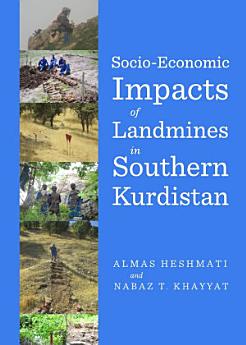Socio-Economic Impacts of Landmines in Southern Kurdistan
Dec 2012 · Cambridge Scholars Publishing
Ebook
345
Pages
family_home
Eligible
info
reportRatings and reviews aren’t verified Learn More
About this ebook
The Kurdistan Region of Iraq has been massively contaminated by landmines and unexploded ordnance. This will continue to be a major obstacle for development and economic growth, particularly in the rural border communities. The mines were used systematically by the central Baathist government in its efforts to de-populate the Kurdistan Region and to weaken the Kurds’ demands for regional self-determination. This work investigates the magnitude of the landmine problem in the region, and the landmine action activities undertaken to rehabilitate, reconstruct, and develop the region. In addition to that, this work emphasizes the social, health, educational and economic impacts of landmines, as well as the legal consequences. In order to achieve the abovementioned objectives, this work is divided into fifteen chapters. After providing an introduction and background to the landmine problem, the authors discuss the scope of the problem, both in the Kurdistan Region and internationally. The methods of dealing with mines and their consequences are reviewed. The issues of landmine action, impact surveys, factors influencing the survey process, and mine actions activities are also discussed. A comprehensive review of the outcome of the problem of landmines in the Kurdistan Region has been conducted. The nature and characteristics of the problems faced by Kurds are discussed in more detailed form by looking at case studies. Here the economic, social, and health impacts of landmines in the region are assessed. The issues of the human, security, and political impacts of landmines are further addressed, followed by an assessment of mine action resources and its progress, education, and various preventive measures. Finally, a number of policy recommendations are provided to prevent the use of mines in the future, and to take legal action against landmine users for clearance, rehabilitation, and compensation issues.
About the author
Almas Heshmati is Professor of Applied Economics at Korea University and Research Associate at Soran University. He held similar positions at Seoul National University, the University of Kurdistan – Hawler, the RATIO Institute (Stockholm) and MTT Agrifood Research (Helsinki). He was a Research Fellow at the World Institute for Development Economics Research, United Nations University, and Associate Professor at the Stockholm School of Economics. He holds a PhD degree from the University of Gothenburg (1994). In addition to more than one hundred scientific journal articles, he has published books on the EU Lisbon process, global income inequality, East Asian manufacturing, Chinese economy, technology transfer, information technology, sustainable development and power generation.
Nabaz T. Khayyat received a BSc in Mathematics from the University of Salahaddin Erbil (1993), a High Diploma in Artificial Intelligence and Database Design from the University of Technology in Baghdad (1994), and an MSc in IT Engineering from the Seoul National University in South Korea (2010). He worked for the UN for five years, as well as different international organizations, and recently held a position with KRG as an Information Management Advisor in the Ministry of Agriculture and Water Resources. Currently, he is studying for a PhD in Engineering at the Seoul National University in South Korea, and is studying for a PhD in Economics at the Swiss Management University in Switzerland.
Rate this ebook
Tell us what you think.
Reading information
Smartphones and tablets
Install the Google Play Books app for Android and iPad/iPhone. It syncs automatically with your account and allows you to read online or offline wherever you are.
Laptops and computers
You can listen to audiobooks purchased on Google Play using your computer's web browser.
eReaders and other devices
To read on e-ink devices like Kobo eReaders, you'll need to download a file and transfer it to your device. Follow the detailed Help Center instructions to transfer the files to supported eReaders.






